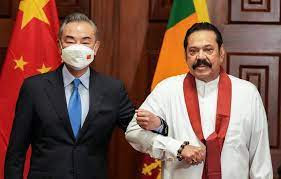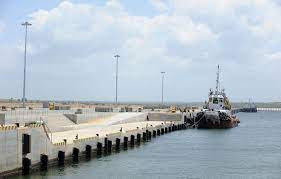Sri Lanka seeks restructuring of Chinese loans amid financial crisis
Sri Lanka is going through severe economic crisis and seeking bail out from China to improve the financial situation
The Sri
Lankan government is also seeking access to preferential credit for imports of
essential goods from China. Sri Lanka is going through a severe economic crisis
and wants some breathing space to manage its fast depleting foreign reserves.
President
Gotabaya Rajapaksa told visiting Chinese Foreign Minister Wang Yi that it would
be “a great relief to the country if attention could be paid on restructuring
the debt repayments as a solution to the economic crisis that has arisen in the
face of the COVID-19 pandemic,” according to a statement from his office.
Rajapaksa
asked Wang for a concessionary credit facility for imports so that industries
can run without disruption, the statement said. He also requested assistance to
enable Chinese tourists to travel to Sri Lanka within a secure bubble.
China
considers Sri Lanka to be a critical link in its Belt and Road global
infrastructure initiative. Relations were recently strained over a shipment of
Chinese fertilizer that allegedly contained harmful bacteria, and business
agreements that were signed with China’s rivals, the United States and India.
Sri Lanka
has benefited from billions of dollars in soft loans from China but the island
nation is currently in the midst of a foreign exchange crisis placing it on the
verge of default, according to analysts. China hasn’t issued public statement
so far regarding the Sri Lankan request.
The tourism industry, which represents over 10% of the country’s Gross Domestic Product (GDP) and brings in foreign exchange, has been hit hard by the coronavirus pandemic. As a result, forex reserves have dropped from over $7.5 billion in 2019 to around $1.6 billion in December 2021.
The
government’s ban on the use of chemical fertilisers in farming has further aggravated
the crisis by dampening agricultural production. Earlier this year, Mr.
Rajapaksa made public his plan to make Sri Lanka the first country in the world
with an agriculture sector that is 100% organic.
The Sri
Lankan government has blamed speculators for causing the rise in food prices by
hoarding essential supplies and has declared an economic emergency under the
Public Security Ordinance. The army has been tasked with the duty of seizing
food supplies from traders and supplying them to consumers at fair prices.
It has also been given the powers to ensure
that forex reserves are used only for the purchase of essential goods. The
government has refused to end its aggressive push for complete organic farming
claiming that the short-term pain of going organic will be compensated by its
long-term benefits. It has also promised to supply farmers with organic
fertilisers as an alternative. Further, Sri Lanka’s central bank earlier this
year prohibited traders from exchanging more than 200 Sri Lankan rupees for an
American dollar and stopped traders from entering into forward currency
contracts.
Sri Lanka's
COVID-stricken economy is being likened to a ticking time bomb that could go
off at any moment as foreign reserves plummet, the cost of living rises and the
central bank carries on printing money.
The Central
Bank of Sri Lanka printed over 130 billion rupees ($640 million) in October
alone, but that is just the iceberg's tip. From December 2019 to August 2021,
Sri Lanka's money supply increased by 2.8 trillion rupees -- a massive 42%.
Since growth
in 2020 was -3.6% and is expected to be around 4.5% in 2021, real net growth
for the two years will be "about 1%.
Last week,
the Lanka Indian Oil Company, which competes with the state-run fuel
distributor Ceylon Petroleum Corporation (CPC), announced a 5-rupee increase
per liter of fuel with effect from Oct. 21. CPC has since been seeking approval
to increase fuel prices after suffering a loss of 70 billion rupees this year
up to August.
Sri Lanka's
inflation rate has increased this year from around 4% to about 7%, but fell
back slightly in September. The September food index was meanwhile up 22%
compared to two years earlier.
In 2019,
soon after President Gotabaya Rajapaksa was elected president, sweeping tax
cuts were announced to make good on an election pledge. The bonanza included
cutting value-added tax to 8% from 15%, and abolishing the 2% nation-building
tax on domestic goods and services.
The
financial crisis was brought on soon after President Rajapaksa did away with
taxes, and following their removal government revenue fell by nearly 30% in
2020. The government created the financial crisis itself, but certainly the
pandemic made it more complicated, resulting in total mismanagement of the
economy.
Sri Lanka
faces one of its worst economic crises, with foreign reserves down to around
$1.6 billion, barely enough for a few weeks of imports. It also has foreign
debt obligations exceeding $7 billion in 2022, including repayment of bonds worth
$500 million in January and $1 billion in July.
The
situation has left households grappling with severe shortages. People wait in
long lines to buy essential goods like milk powder, cooking gas and kerosene.
Prices have increased sharply, and the Central Bank says the inflation rate
rose to 12.1% by the end of December from 9.9% in November. Food inflation
increased to over 22% in the same period.
Because of a
currency shortage, importers are unable to clear their cargo containing
essentials and manufactures are not able to buy raw materials from overseas.
Khalid
Bhatti
















Post a Comment